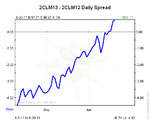How do companies like Ryanair hedge multi year spending on fuel?
You often see the ceo of ryanair come on and say they are hedged against oil since $84 but is that for 1 fiscal tax year only?
It's one thing to say you have hedged a fixed amount (like house value or foreign currency, fixed assets) but when they don't know their fuel usage year per year, would they just add to the hedge?
Say they were hedged at 84 this year, but next tax year oil was at 100, they could hedge again but then their operating profit would already be significantly lower...
You often see the ceo of ryanair come on and say they are hedged against oil since $84 but is that for 1 fiscal tax year only?
It's one thing to say you have hedged a fixed amount (like house value or foreign currency, fixed assets) but when they don't know their fuel usage year per year, would they just add to the hedge?
Say they were hedged at 84 this year, but next tax year oil was at 100, they could hedge again but then their operating profit would already be significantly lower...

